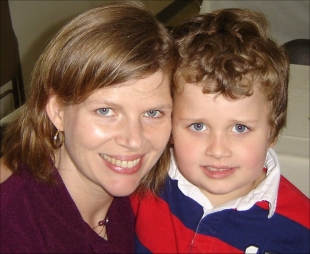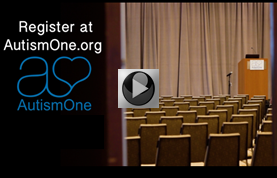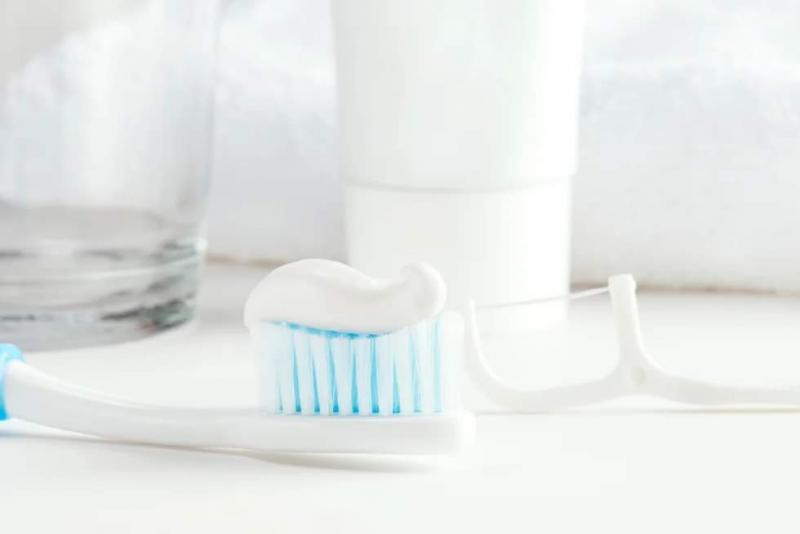A Road to Recovery

Note: I wrote this as a contest piece two years ago to an audience unfamiliar with autism.
One day my life changed. No one died. I didn't have a new baby. There wasn't a terrorist attack. My son was diagnosed with autism. It was absolutely devastating.
The first time I cried was in the parking lot of the psychologist's office. I cried when I told my mother who was at home watching our baby daughter. And again when I told my husband when he came home from work. And again when I told our pastor Sunday morning. I probably cried every time I said autism for a month.
Our beautiful blue-eyed blond curly-headed boy would not have the future I had envisioned for him. He may never go to a regular school, be in the band like his mom, or on the forensics team like his dad. He wouldn't go to college, get married or have children. It would be the end of the Rupe family name on our branch of the family tree. All of these far away events seemed to be the first I thought about.
I decided I wasn't about to let autism get the best of me or my son. I set to work searching the internet for what we could do. Fortunately, there is much you can do for autism. In that sense we were lucky and I felt hopeful that something surely in all these therapies would help Kyle. Maybe? I feel blessed to have found the Autism Research Institute and Talk About Curing Autism (TACA) first. TACA had a southern California message board on which I started posting my many questions. I met some other moms near me who helped me understand the special diets and other biomedical interventions that would help Kyle on his road to recovery. Yes! Recovery! Some children with autism do recover and completely lose their diagnosis of autism. Why isn't this front page news? Why didn't the psychologist tell me about this? It would take me a few more years to learn the whole story. The first nay-sayer I met was Kyle's neurologist. She said, "Shame on that doctor for giving parents such false hope," referring to the biomedical treatments book I had brought along.
We took Kyle to see a Defeat Autism Now! doctor. After many tests we found that Kyle was intolerant to over 30 foods including milk, wheat, chicken, potatoes, soy, yeast, and the list went on and on. It was a lot of hard work to keep him on a special diet. But since he was just 2 ½ I could control what he drank and ate fairly well. What did I have to lose? It was something so easy to try. I was elated to see the fog lifting from Kyle's head three days after we removed all milk products. He colored a page in his coloring book – each character was a different color – not the usual scribbling over the whole page. As we removed more and more foods from the list we saw more and more improvement. Eventually his sense of pain returned. Imagine celebrating the first day your four year old cries because he fell down! In addition to removing the foods that were not good for him, we added proper nutrition in the form of concentrated Chinese food herbs. We were going to start rebuilding his body stronger and healthier than before.
Intensive therapy was another piece of the program. Fifteen hours a week for a two year old is not uncommon. In fact the recommendation is 40 hours a week. It was hard for me to watch him at first. He didn't want to sit in the chair at the little table with the therapist. He didn't want to listen to her, or hear her voice at all. I just wanted to hold him. But, she did it! His therapists were able to help him and they really loved him too. His eye contact had gotten worse after his diagnosis. Little by little it started to come back. He was also able to make a few speech sounds. He would sit in his chair and sort little animals by color, find matching objects in photos and, of course, get to play with his favorite spinning toy as a reward.
A friend of my best friend told her that vaccines cause autism. When she told me this I wrote it off as desperate parents trying to blame someone for their misery. I wasn't one of those parents. I could handle this—not by myself, but I could do a good job. But, I did research it some more. I found that the preservative in many vaccinations is mercury-based thimerosal. There were never any safety studies done on this preservative, except one done in 1930. All the "patients" died soon after receiving it because they were all adults with meningitis. When the number of vaccinations nearly tripled in the 1990s, no one had bothered to add up the amount of mercury these babies were getting. Who injects a newborn with the second most toxic substance known to man anyway? Just so vaccines can be made more cheaply? No way this could be true, but more research into real clinical and toxicological studies proved that it was. I was in the deepest hole of my life. How could I have been so blind and followed my pediatrician's advice on giving vaccinations. It was my responsibility to know the facts and make the right decisions—I was the mom! I wanted to curl up in my dark dreary hole and die. I had failed so miserably as a mother. Fortunately, I didn't spend too much time in this hole. My husband saw what was going on and insisted that it was not my fault and that Kyle needed me. I think every mom goes through this point in an autism diagnosis. I was lucky to make it out stronger and more determined than ever to give Kyle the best life I could.
The day after Kyle turned three, the small special education bus pulled up in front of our house and my little boy left for his first day of school. It wasn't a special milestone day. I was not stressed about having my boy taken away; autism had already taken him away. Kyle had never been concerned about being taken from me. I was glad he liked riding the bus because it was a long ride to and from school.
Mornings gave me more time to spend with my almost one year old daughter, Ella. She was a good baby too. She was behind in speech and social skills by eighteen months. Red flags went up everywhere. I was not going to let this happen to her as well. We changed her diet taking away milk and wheat just like her brother. We also stopped vaccinating her. By 2 ½ she had more than made up for her lost time. She rarely stops talking, has great manners and social skills and is a completely normal "neuro-typical" little girl.
Years have passed and my cute little curly blond-headed boy has grown into a very handsome 7 year old. His hair is still wavy, but a darker blond. His eyes are a very dark blue like his dad's. They are especially beautiful because he looks at you when you talk to him or when he is requesting something. I say requesting because he still cannot speak. Does this mean I've given up? No way! He has made tremendous progress with his biomedical interventions and with his traditional therapies. The biomedical interventions have made him feel better so that he can learn more in his therapy sessions. Kyle is a favorite of his therapist's because he is so smart. He is very sneaky and manipulative too. I always have to tell substitute teachers or new babysitters— "Don't let him fool you. He understands everything you say. He can't speak, but he does understand." He knows his way around a computer very well and I think it's because he can communicate with it using mouse clicks – not his voice. We suspect he can read well, but he isn't interested in reading anything other than his favorite book of that week or month.
Kyle is in the equivalent of the first grade, but in a self-contained autism classroom. It's what he needs right now. I'm sad that he has no social skills and doesn't understand emotions, gestures, or facial expressions. Being in a classroom with other autistic children means that he picks up their bad behaviors as well and has no appropriate peer role models except at Sunday School. The advantages are that it is a small classroom and teachers can spend a lot of time with him working on his communication skills – the area with which he needs the most help.
His sister is the greatest therapist we could have ever hoped for. I doubt we would have had another child after Kyle was diagnosed. The risks of another child would have been too high for us. We are so blessed to have her. She engages him daily in all sorts of activities. In many ways she is the big sister. I have to remind her many times each day that she is not the mom though—she gets pretty bossy.
My life is not what I had thought it would ever be. I was managing an engineering department and traveling the world for work. After the twin towers were hit, my husband decided to go active duty in the Navy. I became a stay-at-home mom and it was a very hard adjustment to make. Now I can't imagine how any mom can work full time and take care of the kids – especially a kid with a schedule as busy as Kyle's therapy schedule. Kyle's autism and food intolerances peaked my interest in nutrition and the science of whole foods. Our whole family eats well and is much healthier than we would have been had Kyle not had autism. When I'm not driving to therapy I'm kept very busy with my favorite autism organizations the Autism Research Institute and Talk About Curing Autism. I want to make sure that parents get all the information they need to make informed decisions about their children with autism. I hope and pray for the day when this "job" will no longer be necessary.
Autistic children are recovering all over the world. Kyle may not recover, he may never speak, he may always be in special education—but he does have a college fund we put money into every month. We can see Kyle's potential. We are searching for the missing stone on his road to recovery. We may find it, we may not. But, I will not give up on Kyle. Ever.






emotionally
Very interesting and tragic story in this article.
piese auto dezmembrari ziare horoscop teste program tv filme noi
It is a very hard road but we
It is a very hard road but we must do it. We do for health of our children and that give us hope.
piese auto ieftineasigurari auto ieftinepiese auto importrca ieftintractari autotractoare de vanzaremasini
Just Thanks.
Lisa,
Thank you for sharing your experience. I feel like there is layers of support services, politics, and discussion about Autism. Stories like yours remind people in the general public and organizations that provide assistance and support services what parents are striving for. There can be so much noise. Your story blew it all away for me.
I wish we could stick a story (like a nutrition label) on ever service, product, dietary supplement, treatment, etc to remind us there is a face, a father, a sister, a mother that it is helping. Such a label would make everyday things like a loaf of gluten-free bread seem extraordinary.
an update
I should really post an update to this article soon. In short, my son at almost 9 now has had an amazing year and he IS starting to talk.
Hi Lisa
We would love to hear the updated version!!! You have done so much for your son and he will continue to make improvements. I look forward to seeing you in 2010 in Chicago. Canadian moms are so excited to be in on recovering their children too.
Take Care
Cindy Nickerson
PS I would love to post a video of our boys...can that be done on this site??
Thanks
Wow! Reading this story was like reading my familys auto biography. It is shocking how similiar our boys are. My son is five and we have been using biomedical therapy ever since he was diagnosed. He has made huge gains however he is still not speaking. I was really getting frustrated and ready to throw in the towel until I read this article. Thanks for the inspiration to keep plugging along to find that missing stone on our road to recovery. If we give up on our kids....who else is going to help them?
homeopathic constitutional treatment
I hope you will look into homeopathic constitutional treatment. There is much improvement possible; see a classical homeopath for your child's individual remedy. Have you read Amy Lansky's book "Impossible Cure"? Her son recovered fully and the book explains it well.Her website is that same name. Beautiful story, well written.